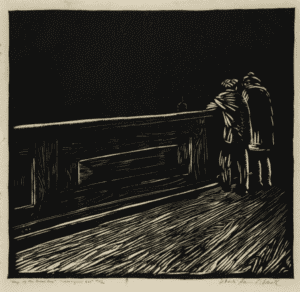Tuhina Raman
Philadelphia, PA, USA
 |
| The Liquor Bar by Wharton H. Esherick. Illustration for the book Song of the Broad-Axe by Walt Whitman. c. 1923. Philadelphia Museum of Art. |
My heart sank as soon as I saw it—tumor nodules in the trachea and a mass eroding through the stent in his airway. I had been hoping against hope. It is always difficult losing a favorite patient to a bad disease.
I had biopsied and stented his airway five weeks earlier. His cough had improved and he said he was feeling great. The repeat CT scan did not look so great, however. It must be mucus clogging the stent, I thought, and prescribed some mucolytics. “I feel great, Doc, I really do,” he reassured me. I told him I wanted to bronchoscope him again. He rolled his eyes and said he was building his wife a new kitchen, so could we just please wait on it? His wife glared at him. I told him he could have two weeks and he had flashed me a sly smile and a wink. His wife squeezed my hand and promised that she would bring him back. She did. On time.
I saw him in recovery after the procedure and broke the news as gently as I could. The nurse drew the curtain around us for privacy, promising to send his wife in as soon as she returned from the cafeteria. His eyes grew misty and he swallowed hard. He asked me how long he had to live. I gave him the same answer I give everyone in his position. We really never know but we can estimate based on statistics. He asked me to draw up a chair and put my feet up.
He then told me the story of the two people he seemed to care most about in his life. His wife was the first. “I’ve lived a good life, Doc. I just need time to get everything settled for my wife. I’m building her this new kitchen and I want to settle my finances so she will want for nothing. Don’t tell her, Doc, please. I will tell her in my own time.” I listened and involuntarily reached for his hand. He also told me that he cared deeply for his son-in-law, who had wanted to bring him for this appointment but was tied up in work. The young man saw his father-in-law at least twice a week for a drink in the evening. They spent so much time together that his daughter had started to complain that he always came home to her much too late. This was the first time in his life he had spent so much time with someone so different from him. My brow furrowed. “Different? How?” I asked. “He is black, different upbringing, different background. Just different,” he said. “But I love him like a son.” He choked on the words. “He asked me to call him to tell him how this procedure went,” he continued haltingly. Then he regained his composure enough to smile slyly at me, “And to have a drink together when I get home. Can I still do that?”
His wife parted the curtains, carrying coffee. She set it down, planted a kiss on his forehead, and looked at me anxiously. I looked at him. He shook his head at me and closed his eyes but did reach over for her hand. I told her as succinctly as I could what I had found and outlined the next steps. A repeat consultation with the oncologist to change the chemotherapy and consideration for additional radiation. Their eyes met. He was clearly petrified that she was going to have a meltdown and dissolve into tears. I stopped talking to give her the space to do just that. She, however, did nothing of the sort.
Clear-eyed, and with her hands firmly clasped around his, she nodded at me and said, “Alright, that’s that.” Dumbfounded, he looked at me helplessly. “He is a good man,” she said to me, as if in explanation. Something shared from one woman to another. An understanding. We both turned to smile at him.
“Go enjoy that drink with your son-in-law,” I said.
TUHINA RAMAN, MD, FCCP, is an interventional pulmonologist practicing at Thomas Jefferson University Hospital. Previously she studied medicine at the Hospital of St. Raphael, Thomas Jefferson University Hospital, and the University of Arkansas School of Medical Sciences. She is a member of the American College of Chest Physicians, the American Thoracic Society, and the American Association for Bronchology and Interventional Pulmonology. She believes that each physician has a patient that remains etched in their memory, and she aims to honor these patients through her writing.
Winter 2019 | Sections | End of Life

Leave a Reply